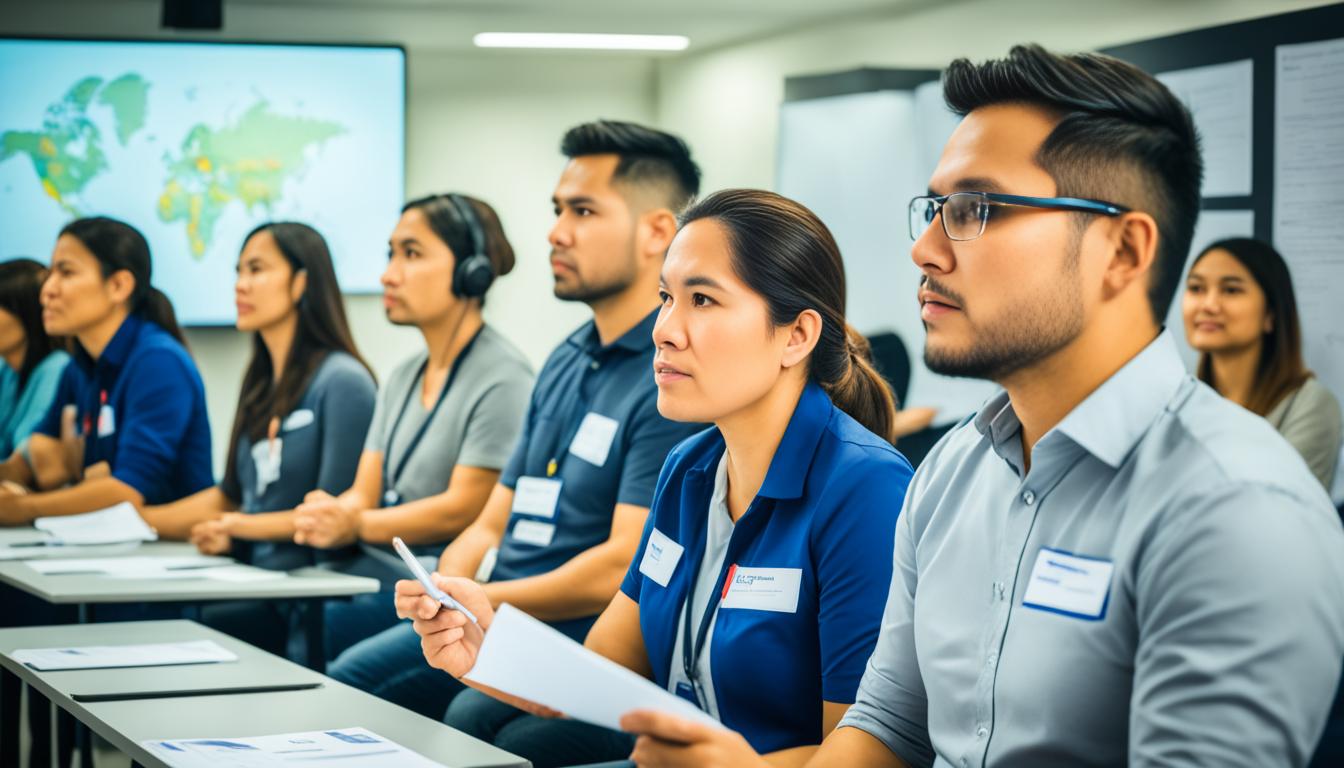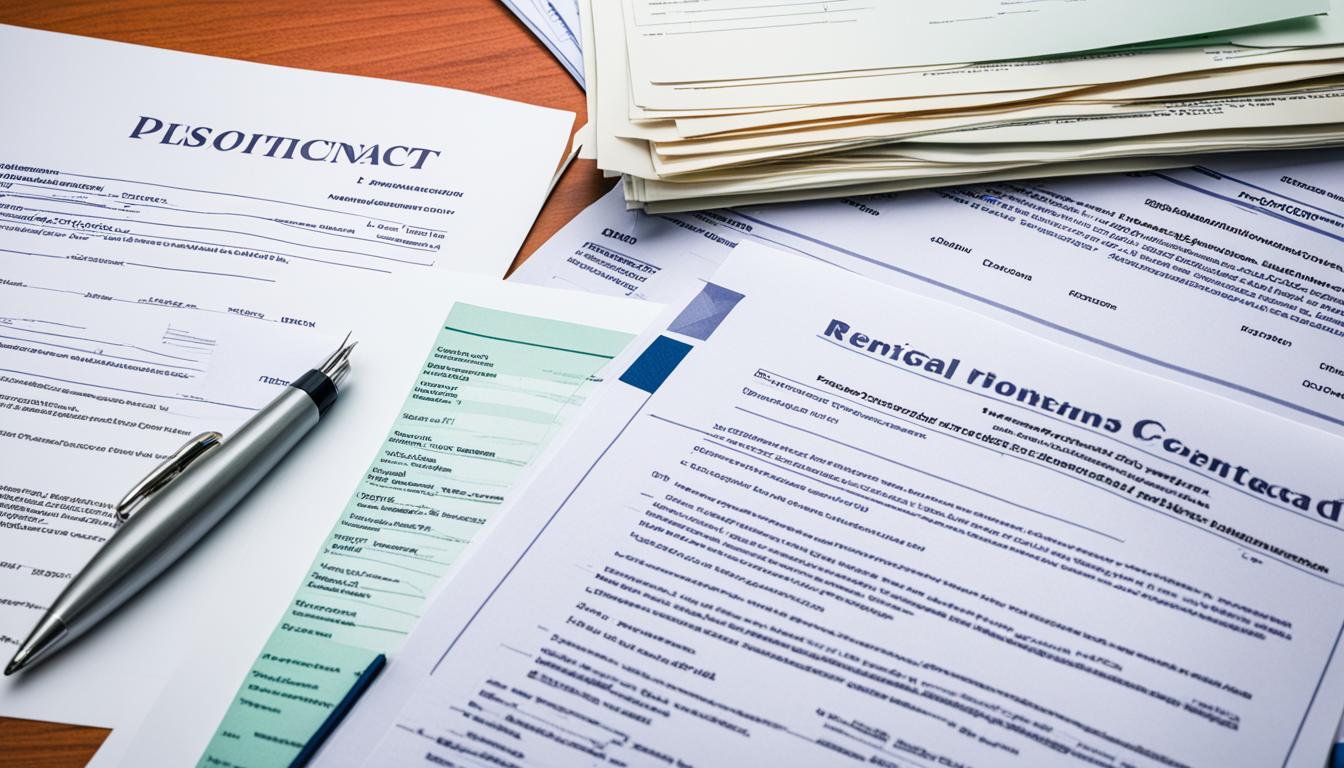
Filipino workers are highly valued in Europe because of their skills and dedication. They can find jobs from professional roles to skilled work. Often, the lure is the good pay and chances for career growth. Yet, it’s important for them to know about the legal side of working abroad. This means needing the right permits and visas.
This guide spells out the steps Filipinos should take for a legal and smooth Europe work journey.
Key Takeaways:
- Filipino citizens are in demand for their skills and work ethic in Europe.
- Working in Europe requires meeting legal requirements and obtaining work permits and visas.
- This legal guide provides a step-by-step process for Filipino citizens working in Europe.
- Understanding labor laws and regulations is crucial for a smooth work experience in Europe.
- Legal assistance and consultation with relevant government agencies can provide additional support and protection for Filipino workers in Europe.
Step 1: Get Your PEOS Certificate
Before you start working in Europe, you need your PEOS certificate. This seminar is a must for all who want to work outside the Philippines. It’s run by the Department of Migrant Workers (DMW).
The PEOS provides a lot of information on how to find work legally overseas. It’s very important as it answers many questions OFWs often have. This seminar helps make sure you’re ready for work abroad.
To join the PEOS seminar, sign up on the DMW Online Services site. Then, register for the free PEOS seminar on their page. You’ll learn about labor laws, work conditions, your rights and duties, culture shock, and managing your money.

After finishing the PEOS seminar, you get your PEOS certificate. This certificate is very important before you travel abroad to work. It shows that you know the basics for work overseas.
Getting your PEOS certificate is a big step for working in Europe. Remember, it’s key to attend the PEOS seminar and get your certificate first. This sets you up for a smooth and legal work journey.
Step 2: Submit Work Requirements
After getting the PEOS certificate, Filipino citizens move to step 2. Here, they submit work requirements. This ensures they are well-documented and qualified for the job they want.
The basic work requirements include:
- Application form: You must fill out the application form the hiring company or agency provides. It includes your personal info, contact details, and job-related info.
- Personal data sheets: These sheets detail your education, work history, skills, and other qualifications. They give employers a good look at what you can offer.
- Passport: It’s important to have a valid passport for international travel. Check its expiration date and renew if needed. A passport is key for going abroad and proves who you are.
- Certificates of employment: You need certificates from past jobs to show your experience. They prove the roles you had and what you achieved at work.
It’s vital to have your documents ready before you apply. This makes the application process smoother. Plus, it shows you’re organized and serious about the job.
“Submitting the required work requirements accurately and promptly increases your chances of securing desired job opportunities and expediting the application process.”
When you submit your work requirements, you show proof of your skills and background. These help employers choose the right candidates. They make it clear you’re fit for the job.
Benefits of Submitting Complete Work Requirements:
Handing in all required work info has many pluses:
- Better odds of getting the job you want
- A smoother process for applying
- It boosts your image as a professional
- Employers can quickly see if you’re a match for the job
Being ready with all documents helps recruiters and employers to quickly understand your application. It’s key to gather and submit all necessary info promptly and correctly.

Step 3: Undergo Preliminary Interview and Evaluation
Once you submit your work requirements, you’ll have a preliminary interview and evaluation. This step is key and done by the company. They check if you fit the job’s qualifications and basics.
They might look at your skills and work through tests or more interviews. So, be ready. Know your job details and look over what the job asks for from you.
Be ready to talk about your work history, school, and any needed certifications. Show where you shine. Make it clear how your skills match the job needs. Also, show you’re excited and ready to learn at the new job.
See, this meeting lets the company learn more about you. Make a good impression. Ask smart questions. Show you’re interested. This can help you move forward in the job selection.
Tips for a Successful Preliminary Interview and Evaluation:
- Research the company and the job position beforehand to demonstrate your knowledge and interest
- Prepare answers to common interview questions and practice your responses
- Showcase your relevant skills, experience, and qualifications
- Highlight your adaptability and willingness to learn
- Be professional, polite, and confident during the interview
| Benefits of a Preliminary Interview and Evaluation: |
|---|
| 1. Provides an opportunity for employers to assess your qualifications |
| 2. Allows you to showcase your skills, experience, and enthusiasm for the job |
| 3. Helps you understand the job requirements and expectations |
| 4. Gives you a chance to ask questions and clarify any doubts |
| 5. Increases your chances of progressing further in the hiring process |
Finishing the preliminary interview is a big step. It lets you and the company see if you match. Go in strong, ready, and show them what you’ve got. This can help you land the job.
Step 4: Undergo Medical and Trade Testing
After passing the preliminary review, it’s time for Filipinos to move to step 4. Here, they will get their health and work skills tested. This makes sure they are healthy for the job and fit the country’s health rules.
Countries might need different health tests because of the world’s health status and rules. This might include COVID-19 tests. These tests help keep everyone in safe work and travel conditions.
After the health tests are okayed, people must also pass tests for their job skills. These tests check if they have what it takes for their chosen job.
Remember, the results of these tests are very important for the job process. They tell if someone is ready to work and is skilled in what they do.
When someone passes all these tests, they can sign the work contract. This is a very important paper. It says what the job is, what the person must do, and what they will earn.
It’s very important to read and understand the work contract before signing. It’s smart to get advice from a lawyer or someone who knows about these things. This makes sure the contract is fair and includes what you expect.
| Steps in Section 4 | Action |
|---|---|
| 1 | Successfully pass preliminary interview and evaluation |
| 2 | Undergo medical examinations and health tests |
| 3 | Complete trade testing specific to chosen profession |
| 4 | Review and sign the employment contract |
Next, after signing the contract, get ready for more steps. This includes getting all the needed documents official with the right places. Then, attend a special meeting for tips on leaving and working overseas. Also, make sure all your papers are correctly checked at the Labor Assistance Center.
By going through all these steps carefully, Filipinos can start their overseas job journey well. This makes sure everyone follows the rules and is set for success abroad.
Conclusion
Working overseas can really boost your career and help your family financially. But, it’s really important to know and follow the rules of the country you’re going to. This guide tells you everything you need to do to work legally in Europe.
Make sure you follow all the steps and meet every requirement. This way, your journey to working abroad will be much easier. Remember, different European countries have different rules for work visas and permits. So, do your homework on your chosen destination.
It’s a good idea to get help from a legal expert or contact government offices. They can give you more advice and help. This ensures you know your rights and are safe while working in another country.
FAQ
What is the Pre-Employment Orientation Seminar (PEOS) certificate?
The PEOS certificate is essential for prospective overseas Filipino workers (OFWs). The Department of Migrant Workers (DMW) offers this seminar. It teaches how to find work legally and addresses common OFW concerns.
How can I enroll in the PEOS seminar?
To sign up for the PEOS seminar, visit the DMW Online Services website. Register and choose the PEOS seminar at no cost.
What documents are required for work submission?
For job submissions, you’ll need several documents. This includes personal data sheets, passport photos, and more. Don’t forget the Social Security Services form OW-1 and an updated PhilHealth Member Data Record.
What happens during the preliminary interview and evaluation?
A recruiter or local agent will talk with you during the preliminary interview. They assess if you’re a good fit for the job. This might involve tests and discussions to check if you meet the requirements.
What is the purpose of medical and trade testing?
Medical and trade tests are vital. They ensure you’re healthy and meet the country’s health needs. These tests sometimes include COVID-19 checks.
What should I do before signing the employment contract?
Before you sign any contract, carefully go through the terms and conditions. Understand your job’s details and your obligations fully.
What are the next steps after passing the medical and trade tests?
Once you’ve cleared these tests, it’s time for more steps. This includes getting your documents processed by embassies or entities. You must also go to a Pre-Departure Orientation Seminar.
Where can I seek legal assistance or consultation?
It’s smart for Filipino workers to get legal advice. Talk to government agencies for proper information and protection during work abroad.
